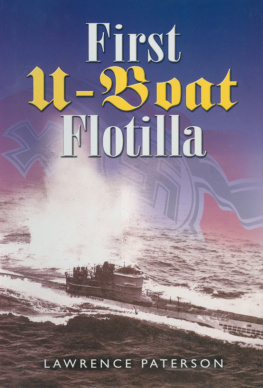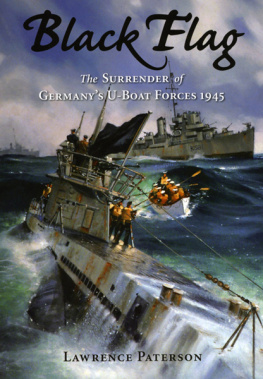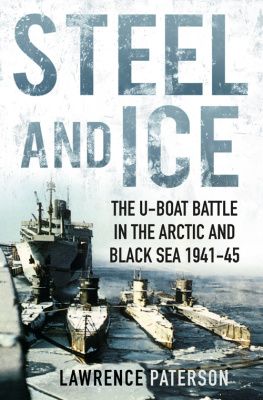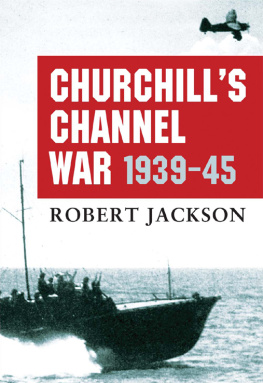THE
FIRST U-BOAT
FLOTILLA
THE
FIRST U-BOAT
FLOTILLA
by
LAWRENCE PATERSON
First Published in Great Britain 2002 by
LEO COOPER
an imprint of Pen & Sword Books Ltd
47 Church Street
Barnsley, S. Yorkshire, S70 2AS
Copyright 2002 by Lawrence Paterson
ISBN 0 85052 816 X
A CIP record for this book is available from The British Library
Typeset in 10/12.5 Plantin by
Phoenix Typesetting, Ilkley, West Yorkshire.
Printed by CPI UK.
To Robert Strauss and Jon Gawne
For starting it all
CONTENTS
Many people have helped with the writing of this book. I would particularly like to thank Sarah Burbridge; Audrey and Shane Paterson; Jon Gawne; Urbain Ureel; Hans Milkert (President of Cuxhaven Kameradschaft); Yannick Creach, Hannelore and Gesa Suhren; Frank James and Angus MacLean Thuermer for their help with information and research. Ralf Bublitz one of lifes good guys helped enormously with German translations, as did Robert Strauss mentor, agent and squirrel hunter. Neville Burbridge and Jan Dekeijser assisted me a great deal by proof reading the first draft and kicking me when I needed it, while Elizabeth Burbidge kindly let me invade her front room while writing the first draft. From the Royal Navy Submarine Museum at Gosport, Maggie Bidmead (Head of Archives) and Debbie Corner (Head of Photographic Department) were extremely helpful with both reference material and photographs. The Brest Naval Library and Altenbruchs U-Boot Archiv also provided many excellent reference sources. I would also like to thank Jak Mallmann Showell, Eberhard Hoffman, Jrgen Weber (Mnchen U-Boot Kameradschaft) and Gnther Hartmann (Verband Deutscher U-Bootfahrer). Egbert Kaibert, Peter Wimmer, Paul Darcy and Nicolo Thierry all provided valuable photographs for inclusion within this book, and Ranieri Meloni created the wonderful illustrations of the three U-boat types used by 1st U-Flotilla. I would also like to thank my editor, Tom Hartman, and everybody at Pen & Sword. Of course very special thanks go to the U-boat veterans who took the time to answer queries of mine, in particular: Georg Seitz (U604 & U873); Erich Topp (1757, U552 & U2513); Gnther Poser (U59 & U202); Claus-Peter Carlsen (U251 & U732); Peter Wimmer (U556) and Paul Helmchen (U441 & U1407).
Photographic Acknowledgements:
Ranieri Meloni, Plate 1; National Archives and Records Administration, Plates 2, 23, 32, 38; Royal Navy Submarine Museum, 12, 15, 19, 20, 21, 26, 30, 36; Authors Collection 3, 5, 6, 7, 9, 11, 16, 24, 25, 27, 29, 33, 34, 35; Egbert Kaibert (Peter Wimmer), 13; Siftung Traditionsarchiv Unterseeboote, 4, 17; Nicolo Thierry, 10, 14, 18, 28, 37; Paul Darcy, 22.
Military units are renowned for their strictly regimented administration. Each decision, movement or event receives its official documentation filed within the paper archives for that particular formation. In times of conflict another administrative volume is added to the list the War Diary. Drawn largely from the War Diary (Kriegstagebuch) of the Second World Wars 1st U-boat Flotilla, this book seeks to chart the momentous events between 1935 and 1944, the years of formation and dissolution. The course of the book closely follows the entries recorded by various flotilla commanders over this period, beginning in August 1939 as war threatened Europe. The flotilla War Diary was a formal record of administrative matters and combat results, compiled by the flotilla commander. While his was not necessarily the only hand to record notations within its pages, the words belonged to him and he was entirely responsible for the diarys contents.
A Flotilla by definition is a grouping of vessels of an undetermined size. Germanys U-boats were constantly shuffling between flotillas, the unit providing an administrative, not tactical, control over U-boats and their operation. Tactics and operational jurisdiction was held firmly in the hands of BdU. This is not, however, a history of the Battle of the Atlantic or U-boats in general; those stories are told in numerous excellent and authoritative published works. The events of the war at sea provide a backdrop against which the drama of Germanys premier submarine unit was played out. The U-boats from this unit began their war laying mines along Britains eastern seaboard and ended it fighting desperate and hopeless running battles against Allied naval forces intent on their destruction. The roller-coaster fortunes of Karl Dnitzs Grey Wolves as a whole are mirrored in the events that occupy the following pages. By necessity there is a brief history of the rebuilding of Germanys U-boat arm following the humiliation of defeat in 1918. This has relevance to Karl Dnitzs entry into the story and the birth of the Weddigen Flotilla embryo of 1st U-boat Flotilla.
By its very essence a War Diary records the operational events affecting the unit concerned. Within the pages of 1st U-Flotillas Diary are multiple references to U-boats occupying the same port. Apart from early stages of the war or where particularly relevant I have omitted these U-boats their flotillas have their own stories to tell. Long periods of time were spent with no recorded duties; therefore this is not a literal day-by-day translation of the Diary in its entirety. Several patrols undertaken produced no result and achieved nothing. They have sometimes also been omitted. Again, there are available excellent reference sources for sailing dates and patrol areas and I have not replicated them here. Sinking reports are included wherever they are mentioned in the War Diary. The dates of the presumed or known loss of a U-boat will be mentioned and, as far as possible, the story of its demise told retrospectively. Sadly there are many of them.
Many words remain in their original German accompanied by translations, the non-English word italicized for clarity. Ranks I have also sometimes retained in full. I hope that the length and apparent complexity of many of these German words and titles will not deter non-German-speaking readers. Of all the words encountered within the following pages there is one in particular that repeats all too often Vermisst, which in English means missing.
Rank table
German | (medical) | British/American |
Grossadmiral | Admiral of the Fleet/ Fleet Admiral |
Admiral | Admiral |
Vizeadmiral | (Admiralstabsarzt) | Vice-Admiral |
Konteradmiral (KA) | (Admiralarzt) | Rear Admiral |
Kommodore | Commodore |
Kapitn zur See (KaptzS) | (Flottenarzt) | Captain |
Fregattenkapitn (FK) | (Geschwarderarzt) | Commander |
Korvettenkapitn KK) | (Marineoberstabsarzt) | Commander |
Kapitnleutnant (Kptl) | (Marinestabsarzt) | Lt Commander |
Oberleutnant zur See (ObltzS) | (Marineoberassistenzarzt) | Lieutenant |
Leutnant zur See (LtzS) | (Marineassistenzarzt) | Sub Lieutenant/ Lieutenant (jg) |
|
Next page
















